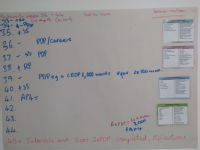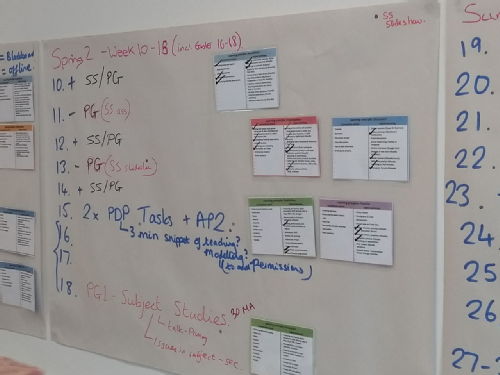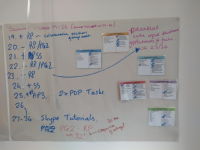All 2 entries tagged Abc
View all 3 entries tagged Abc on Warwick Blogs | View entries tagged Abc at Technorati | There are no images tagged Abc on this blog
October 29, 2018
Running ABC workshops – Abigail Ball
In March 2018 I attended a JISC workshop on data-informed blended learning design and was introduced to the ABC Model of Curriculum Development by Natasa Perovic and Clive Young from UCL. The event was timely for me as I was wrestling with how to effect transformative change on established face-to-face programmes with respect to Technology Enhanced Learning (TEL) as opposed to reactive and incremental change which seemed the increasing norm.
The workshop demonstrated how a facilitator could encourage participants to evaluate their current teaching practice and through making relatively simple changes, develop a more blended approach supported by the appropriate use of technology. I was conscious that I did not want to tell staff that they needed to make changes; instead I wanted the recognition of the need for change to come from them; for them to take ownership of the change process.
In June 2018 I was asked to run a curriculum development session on a planning day for the team developing our online PGCE International programme (PGCEi). The original plan was for me to have a 90 minute slot (the same length of time as the original JISC ABC workshop) and to facilitate participants through the process of identifying how the current PGCE was delivered and what they might want to reuse, repurpose or develop afresh for the new PGCEi.
What quickly became apparent was that the original time slot was simply too short; we ended up working on this for four hours. We developed a comprehensive timeline for the programme (see Figure one below) which helped to frame our discussions. We then went through the teaching activities the team had provisionally identified and mapped them onto the different learning types using Laurillard’s Conversational Framework. This showed clear clusters of learning type (e.g. acquisition) which enabled staff to discuss how they might adapt their teaching activities to use some of the less well-used learning types (e.g. investigation).
Figure one
At no point did I suggest that an over-reliance on one particular learning type was poor academic practice or that staff should reduce the amount of acquisition they used with the students. The staff came to this conclusion themselves. The visual nature of the storyboard activity worked really well and made it easy for staff to see the impact of their changes. Each of the learning activities was explicitly related to the assessment points to ensure relevance for the students. When these were spread over the length of the programme it became clear where potential stress points might be and how we could mitigate them by adjusting the learning type (where appropriate) or by reducing the learning activities generally to gain more of an even flow across the programme.
We have subsequently met to discuss specific learning activities in more detail and each time the timelines have been used to frame the discussion. Lessons learned from the workshops include:
- Allow plenty of time for the programme (90 minutes is not really long enough; I would allocate at least half a day)
- Use an appropriate room which gives plenty of space for spreading out and sticking things up on the walls (for a process looking at TEL it is remarkably practical and low-tech!)
- Provide refreshments as this helps the flow of discussion
- Use the ABC icebreaker activities (e.g. creating the Twitter summary); they get staff into the right frame of mind for considering the programme as a whole before getting into the nitty-gritty of the learning activities
October 22, 2018
The ABC of International Curriculum Design – Nick McKie
As part of the curriculum development planning for the Warwick PGCE international course we attended an engaging hands-on session led by lead academic technologist, Abigail Ball.
The main premise of this session was to enable us to identify the key principals of course delivery before we drilled down further into module content planning. The session was structured around the Arena Blended Connected (ABC) curriculum development model which we used as prism through which to craft reflections on our own curriculum development.
The ABC model
Created by UCL Digital Education, the ABC model is a collaborative workshop where a visual story board is produced to sequence learning activities, assessment and outcomes. Through this model we looked at the following different learning types:
- Acquisition: listening to a lecture, reading from books and watching demos.
- Collaboration: discussion, practice and production.
- Discussion: articulate ideas and questions.
- Investigation: explore, compare and critique.
- Practice: adapt actions to the task and use feedback for improvement.
- Production: articulating current understanding and how to apply this.
We initially mapped how both the local (primary and secondary) and international PGCE programmes are/would be delivered in terms of the above learning types, marking the frequency we would use each learning principal (see below).
Firstly, we focussed on the current local PGCE course, plotting in red before mapping the proposed PGCE international course in black. We were then able to understand the difference in terms of delivery approach between the two sister courses which going forward would help to inform our planning.
Local vs international
In terms of production and practice curriculum elements, we saw a close synergy between the local and international offerings. Assessed teaching practice benchmarked against the UK Standards, assessment points throughout the course and masters level assignments being compulsory components.
In comparison to the international programme, we believed the local PGCE is perhaps slightly more acquisition focussed, mainly due to the increased face to face university element including access to conferences and workshops across campus.
In relation to the strengths of the proposed PGCE international course, we were looking at deeper expectations around collaboration, discussion and investigation. These elements would be promoted in terms of the face to face induction, online ‘live’ sessions and self-study preparation.
Conclusions
It was clear from the curriculum development session that the key Pedagogical tenets of the PGCE international programme are to be centred on collaboration, discussion and investigation. Ensuring these elements are woven through the module planning will be a key focus.
The session also helped cement thoughts around the unique selling points of the programme. Whilst the main ingredients of the new course will be international in outlook, alignment to our domestic offering will also provide a ‘local’ UK flavour.



 Abigail Ball
Abigail Ball

 Please wait - comments are loading
Please wait - comments are loading

 Loading…
Loading…

